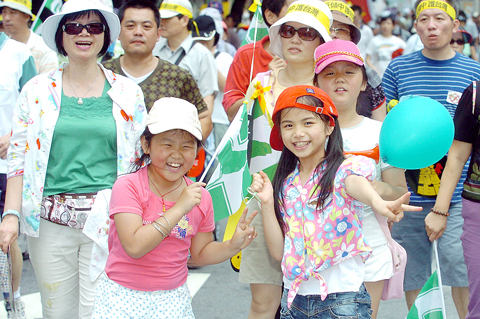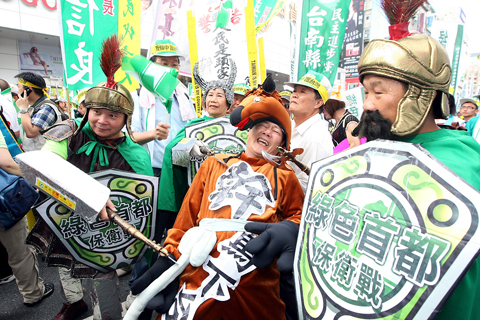Demonstrations against the Ma Ying-jeou (馬英九) administration’s China policies in Taipei and Kaohsiung yesterday also provided an opportunity for participants to show their creativity as they took to the streets.
One man in Taipei was spotted wearing an upside-down bamboo basket, the kind used by farmers to carry produce, on his head as a hat with a banner reading “With the ECFA passed, farmers will eat shit.”
Another protester, surnamed Wang (王), wore a backpack that carried a banner reading, “Fuck, where is 6-3-3?” referring to Ma’s campaign pledge last year that Taiwan’s annual economic growth would be 6 percent, per capita GDP would be US$30,000 and the unemployment rate would be reduced to 3 percent if he were elected.

PHOTO: CHANG CHIA-MING, TAIPEI TIMES
“I’m here today because the unemployment rate has risen to a historic high, affecting many families,” the 54-year-old Wang said.
Wang said he had voted for Ma in last year’s presidential election, but Ma had failed to deliver on most of his campaign promises.
“I pay about NT$400,000 in tax each year, but this money goes to supporting a rice-bug [Taiwanese slang for useless] government — as a taxpayer I feel that I am Ma’s boss and he has done a terrible job,” Wang said.

PHOTO: WALLY SANTANA, AP
Another protester dressed his dog in a shirt that read: “I veto Ma,” while other dog owners had wrapped their pets with colorful protest banners.
Yen Jen-song (顏仁崧) manned a stall on Ketagelan Boulevard selling sun-blocking fishermen’s hats to the protesters. The banner on the 33-year-old’s stall read: “Anti-Ma sun-blocking hats, capable of blocking Chinese UV-rays.”
Yen, who used to be a real estate agent before the economic downturn, said he now works in the service sector because the real estate market had been hard hit by the downturn.

PHOTO: CNA
Another group of protesters wore bamboo leaf hats, used by farmers to shield themselves from the sun, that were decorated with yellow ribbons bearing a variety of slogans, including: “The government sucks.”
One man was seen wearing a plastic apron that had words comparing Ma with Wu Sangui (吳三桂), a Ming Dynasty militant who has historically been considered a traitor to his emperor because he opened the gates of the Great Wall at the Shanghai Pass to let Manchu soldiers into China.
Meanwhile, in Kaohsiung, many demonstrators also carried homemade placards and props.
One marcher held an umbrella plastered with colorful posters and slogans, while another was spotted wearing mask with a sign that said “Say no to Ma influenza.”
A couple drew a horse with its four legs pointing up with the words “corrupted Ma, step down.” The character for Ma’s surname also means “horse.”
Just as some protesters in Taipei attacked a large horse-shaped balloon with sticks, the couple invited marchers to hit their “horse” with canes, water bottles or whatever they had on hand.
Some placards had pictures of Ma with the caption “Recall the defective product.” When one such placard was dropped, people nearby rushed to trample it.

An essay competition jointly organized by a local writing society and a publisher affiliated with the Chinese Communist Party (CCP) might have contravened the Act Governing Relations Between the People of the Taiwan Area and the Mainland Area (臺灣地區與大陸地區人民關係條例), the Mainland Affairs Council (MAC) said on Thursday. “In this case, the partner organization is clearly an agency under the CCP’s Fujian Provincial Committee,” MAC Deputy Minister and spokesperson Liang Wen-chieh (梁文傑) said at a news briefing in Taipei. “It also involves bringing Taiwanese students to China with all-expenses-paid arrangements to attend award ceremonies and camps,” Liang said. Those two “characteristics” are typically sufficient

A magnitude 5.9 earthquake that struck about 33km off the coast of Hualien City was the "main shock" in a series of quakes in the area, with aftershocks expected over the next three days, the Central Weather Administration (CWA) said yesterday. Prior to the magnitude 5.9 quake shaking most of Taiwan at 6:53pm yesterday, six other earthquakes stronger than a magnitude of 4, starting with a magnitude 5.5 quake at 6:09pm, occurred in the area. CWA Seismological Center Director Wu Chien-fu (吳健富) confirmed that the quakes were all part of the same series and that the magnitude 5.5 temblor was

The brilliant blue waters, thick foliage and bucolic atmosphere on this seemingly idyllic archipelago deep in the Pacific Ocean belie the key role it now plays in a titanic geopolitical struggle. Palau is again on the front line as China, and the US and its allies prepare their forces in an intensifying contest for control over the Asia-Pacific region. The democratic nation of just 17,000 people hosts US-controlled airstrips and soon-to-be-completed radar installations that the US military describes as “critical” to monitoring vast swathes of water and airspace. It is also a key piece of the second island chain, a string of

The Central Weather Administration has issued a heat alert for southeastern Taiwan, warning of temperatures as high as 36°C today, while alerting some coastal areas of strong winds later in the day. Kaohsiung’s Neimen District (內門) and Pingtung County’s Neipu Township (內埔) are under an orange heat alert, which warns of temperatures as high as 36°C for three consecutive days, the CWA said, citing southwest winds. The heat would also extend to Tainan’s Nansi (楠西) and Yujing (玉井) districts, as well as Pingtung’s Gaoshu (高樹), Yanpu (鹽埔) and Majia (瑪家) townships, it said, forecasting highs of up to 36°C in those areas